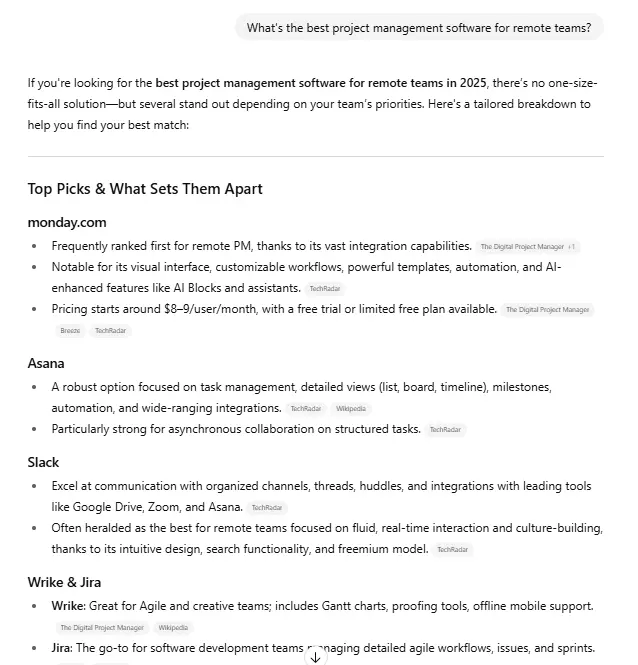Legal Considerations & Communication Tips For Your Remote SEO Team via @sejournal, @HelenPollitt1
Salary and benefits are not the only aspects of hiring fully-remote SEO experts that have legal implications. Here's what you need to factor in. The post Legal Considerations & Communication Tips For Your Remote SEO Team appeared first on...

So, you’ve likely figured out that remote work is here to stay, which means a whole set of different considerations when getting set up.
In the first part of this series on how to build a remote SEO team, we looked into the structure of successful remote teams.
Now, let’s explore the legal considerations and team communication aspects you’ll need to build a remote team, stay compliant, and encourage collaboration.
Legal Aspects of Remote SEO Teams
Salary and benefits are not the only aspects of hiring fully-remote SEO experts with legal implications.
Depending on your team’s base, you may need to make extra considerations around rights and security.
Data Security
Employees working fully remotely may not only be working from their homes.
They may use the flexibility of not being in an office to take working holidays for weeks at a time or simply go to the coffee shop down the road to work.
Because of this, there are extra data security complications.
Confidential Data
In an ideal situation, each team member would have their own private, lockable space to work.
An office outside of the company office.
However, this is a rarity.
Therefore, remote workers must be mindful of who can access their working space or see what they are working on.
Working in a co-working space or a café can mean that other people may see screens with confidential client data or company financial data.
You may need to invest in films for laptop screens that make it harder for other people to read unless directly in front of them.
You may also need to recommend that your team be mindful of the data they leave visible on their screens around other people.
Data Protection Laws
It might not just be a case of wanting to keep client and personal data safe. There might be legal ramifications if you don’t.
In Europe, for example, the General Data Protection Regulation (GDPR) governs employees and stipulates how to treat personally identifiable data.
You’ll need to adapt processes and rules around data security to life outside of the office for remote teams.
The team also needs to be educated on its importance and have the tools to assess their own work environment.
Guidance For Shared Living Spaces
Working full-time from home can lead to lapses in treating work equipment and data differently from personal equipment.
It might be second nature for an employee in an office to lock their laptop when they get up from their desk. But in the comfort and security of their own homes, it might not occur to them to do the same.
Think too, that in an office, most people around work for the same company.
This is not the case in shared living spaces.
It can be a good idea to remind your team of that.
Guidance For Vacated Premises
Hybrid or in-office employees may leave their laptops at work when they go on holiday.
The office is likely to be staffed when they are not there, or in periods of shutdown such as over bank holidays, the office will be securely locked.
There may be times when a colleague’s house, therefore home office, is completely vacant, like when they and their family go on holiday.
Remote workers may need to lock away their company laptops during these times as an extra level of security.
You may need to provide them with the facilities, like a lockable cabinet.
Legal Rights
The legal employment rights of your SEO team may be very different depending on where in the world they are working from.
If all of your team are fully remote but in your state/country, you may not need to consider it as much.
This can affect a lot, for example:
The number of public holidays. The amount of paid sick leave. How much maternity leave? The length of notice they are legally entitled to when terminating their contract.Even if you are not ultimately legally responsible for this area, as a line manager building a fully-remote team, it is wise for you to understand what each member of your team is entitled to.
This will help you plan for cover during holidays, paternity leave, and cases of sickness.
It can also mean you are not accidentally leaving a single team member responsible for the technical health of an entire website when everyone but themselves is on a public holiday.
Optimizing Your Remote Team’s Communication & Collaboration
Once you get past the initial financial and legal hurdles for building a fully-remote SEO team, you can turn your attention to how to make it a fun, productive, and energizing work experience.
Communication
One of the biggest perceived challenges for a fully-remote team is communication.
Many teams struggle to find the right balance between over and under-communicating.
Getting communication right in a fully-remote SEO team is a particularly big priority.
As SEO pros, we often learn from each other, discussing challenges and considering ideas as a team.
A large component of the job for digital PR is ideation, arguably much easier as a group.
Just because your team is fully remote does not mean you have to lose that side of the communication.
Replacing Office Chit Chat
When talking about fully remote versus in-office, the topics often surround the pros and cons and the ease of chatting.
Some people love the buzz of a busy office and the opportunity to connect with colleagues while preparing lunch, or making a coffee.
Others find it distracting or draining to be available to other people constantly.
When discussing the social and community needs of a remote SEO team, it’s important to realize we’re not looking to replicate the office chit-chat but instead replace it.
The goal is to give your team the time for deep-work focus and the opportunity to connect with their colleagues.
One way of doing this is through set times for socializing.
You can set up optional coffee chats once a week or every day so that the whole team can come together for 15 minutes of social chat.
They may want to do this as a whole team or one on one.
This might branch out across the company, so your team gets the opportunity to connect with others that they don’t work with daily.
This way, you can protect their focus and time while enabling them to make space for the social aspect of work.
Video Call Fatigue
In the Covid-19 working from home movement, something that became apparent early on was that in-office meetings quickly got replaced with double the number of meetings via video calls.
This can be completely exhausting and time-consuming.
Be mindful of how you enable your team to structure their days.
Consider call-free hours or days, suggest switching to voice only for some/most calls, or even give people the opportunity to use an avatar for some calls.
Those meetings that could have been an email? Still could have been an email.
Don’t try to foster relationships and teamwork through video calls. It isn’t the way to do it.
Just like in-person meetings need to be arranged mindfully, so do virtual ones.
Instant Message Overload
Working remotely makes it harder for you to call across the office to ask your team member for an update or check that they are OK.
Losing this aspect of working isn’t necessarily a bad thing.
Just because you are in a state where you are ready for an update doesn’t mean you are not interrupting your team member and potentially derailing their concentration.
Let’s not use instant messengers in the same way.
Be thoughtful around how you message people using Slack, Teams, and the various other instant messengers.
Don’t expect an answer from your team straightaway.
You can’t see the look of concentration on their face as they are writing schema or the fact that they are actually making a cup of tea at the time.
Try not to phrase messages with a sense of expectancy for a quick answer.
For longer brain dumps, consider sending your thoughts in an email and use the instant messengers for shorter updates.
One good tip for ensuring your team doesn’t feel obligated to respond instantly is cutting straight to the chase.
Starting a conversation only asking “hi, how are you?” can cause your addressee to feel obligated to answer immediately to find out what you need and how urgent it is.
Instead, if you tell them exactly what you’re after and when you need it, you save them the guesswork or need to reply instantly.
Losing Messages In The Noise
Another risk of fully-remote work is that there is little to distinguish between “this is an important announcement I need to pay attention to and remember” and “this is a status update of lesser importance.”
When your team is receiving hundreds of messages a day from across the company, they may simply miss the one from you asking for them to look at a page that’s 404ing.
Consider setting different channels for social chat, projects, and urgent announcements.
This categorization of messages can help the team to identify how urgent/important the communication is and also find it again a few days (and hundreds of messages) later.
Collaboration
Making sure your team can function as well as any in-office SEO team will be all down to how well they can collaborate remotely.
Several factors impact how you should set your team up for successful collaboration.
Timezones
Your remote team might have people operating in different time zones.
Truly international teams might not have much, if any, overlap of working hours.
This can be very hard to navigate successfully.
There can be the temptation, especially for agencies, to expect SEO experts to be available whenever they need them.
If clients are in different time zones and colleagues, you can guess whose schedule gets prioritized.
When working across time zones, empower your team to be careful with their time.
This means giving them the power to say no to meetings outside of fair working hours.
It also may mean compromising in some instances, but these should be the exception, not the rule.
One way of doing this is to encourage core working hours for face-to-face meetings.
For example, if there is only an overlap of three hours per day when all team members are working simultaneously, try to save any meetings for those three hours.
Async Conversations
Another way to help overcome the challenge of different timezones and the fatigue from too many video calls is to encourage asynchronous communication.
“A quick call” might be convenient for the person who wants instant feedback on an idea, or simply doesn’t want to have to type it all out.
It might be less convenient for the person who should have finished work for the day an hour ago.
Recording voice notes can be a simple way of communicating that doesn’t require a lot of typing.
It can then be listened to at a time convenient to the recipient.
Collaboration tools can also help with the dump of thoughts and allow for asynchronous feeding back.
Tools
So what are some must-have tools for remote SEO teams to collaborate well?
A ticketing system. Along the lines of Monday or JIRA, a ticketing system will help your team keep track of those “ad-hoc” requests sent through email or messenger. It also allows for a centralized place for asynchronous updates on status. Software like Miro or Google Jamboard allows your team to add ideas to a virtual whiteboard without needing to be in front of a physical one. It has the added benefit of being available over time, so teams can go back and see the evolution of ideas. A VPN can be very beneficial in enabling your SEO specialists to see what teammates see worldwide. If your colleague in Mexico has spotted something interesting in the SERPs, there’s no need for extensive screenshotting to communicate it to their colleagues. Their colleagues can proxy their location as Mexico and investigate for themselves. Password manager. Allowing your team to safely share passwords without being in the same room is critical. A password manager like LastPass will allow them to send passwords securely without the risk of doing it via email or the inconvenience of joining a call to share it verbally. Central storage. You will likely need your team to access client-facing templates, each others’ work, and best-practice guides. When everyone works in the same office, in the same timezone, it’s easier to ask for these documents to be emailed when needed. When you don’t know if your colleague is at their desk, or they don’t start work for another three hours, it helps to access these documents for yourself.Motivation
Motivating a fully-remote SEO team is different from an in-person one.
There is less opportunity to reward a team with a trip to the café down the road for an impromptu lunch, or a round of coffees as thanks for their hard work that week.
As a line manager of a fully-remote team, consider how you continue to motivate your team when you aren’t physically around them ever.
Time To Switch Off
A crucial component of keeping a remote team motivated is ensuring they get the time they need to switch off.
It’s easy to see who stays behind late when they are the last to lock up the office each night.
It isn’t as easy to make sure your remote colleague isn’t working too long.
The lack of physical separation between work and leisure can have a mental effect on your team’s ability to switch off at the end of the day.
It is important to encourage your team to find what works best for them.
Whether that’s recommending they disconnect emails from their personal phone to avoid getting pinged from an international colleague at 10 p.m.
Or to physically shut their laptop down at the end of the day and put it away out of sight.
The best way to do this is to lead by example.
Don’t expect your team to be available when you are or check their emails on weekends.
Remind them that you don’t check your Slack messages outside of working hours and designate 6 p.m. onward as family time only.
Celebrations
You might not be able to take them all out for dinner at the end of a long week, but that doesn’t mean you can’t celebrate achievements and milestones with a remote team.
Creating an atmosphere of continual recognition can be a great way to motivate your team.
Weekly “shout-outs” from you as the line manager or even a system of recognition from each other can help to note and celebrate everyone’s efforts.
Bigger celebrations like birthdays and client wins can still be celebrated with dinner or doughnuts.
Instead of taking everyone to the same restaurant, you can give vouchers for the team to take their own families out.
Or provide an allowance for each team member to order food to eat during a video call.
What’s great about remote teams is you get a license to be creative in how you celebrate.
Not everyone wants to go to the pub on a Friday after work.
Not everyone celebrates with food.
Find what works for your team.
The important thing for motivation is to keep acknowledging effort and success.
Clear goals
Another way to keep a remote team motivated is the same as an in-office team, but it bears discussing.
It is beneficial to have an end-point they are working toward to help a team feel united and working in the same direction.
Whether these are as simple as annual traffic and conversion goals or tailored quarterly KPIs and objectives, just make sure your team knows and understands them.
Your whole team should understand the SEO strategy and their own objectives and KPIs within that.
Communicating these across the team can help with individual accountability and the support of colleagues.
It will also help you identify if there are any lulls in momentum.
For instance, your team might have just been through a particularly busy sprint and need a few days to recover and get through the backlog of work.
Without a set of measurable objectives, it’s hard to see if you’re making progress.
It is also difficult for your team to understand how they are performing.
Help your team see and celebrate their progress against goals. It can be hugely motivating.
Productivity
There is less pressure for presenteeism with remote jobs.
As a remote team manager, you will hopefully not be checking up on them throughout the day to make sure they are working.
Instead, you will have hired a team you trust to do their job and will be monitoring quality instead.
When working with a team in an office, you can easily see if someone is being called into meetings constantly or asked questions that keep them from focusing on their work.
Unfortunately, this isn’t really possible when working remotely.
Because of this, you will need to ensure you are helping your team remove obstacles to their own productivity.
Identify Time And Energy Drains
Your team needs to be empowered to monitor their own energy peaks and troughs.
If your company also operates a flexible working schedule, this can be enormously beneficial in helping your team discover their most productive hours and working during those times.
They also may want to keep an eye on what is draining their energy and stealing their time from the core elements of their job.
One way to assist your team is by keeping a diary for a week of the tasks they are working on and their energy levels at the end of them.
Keep Meetings Structured
Meeting overload is a problem in-office and remotely.
Many articles have been written on how to better structure meetings to keep them productive.
Some quick and easy wins, however, are to:
Make sure every meeting has an agenda. Empower your team to turn down meetings when they are not needed. Provide minutes for any group meetings so those who can’t attend can read them back asynchronously. Circulate any pre-reading material for comments before the meeting.It is also a good idea for you as a manager to check in with your team on how they are finding their meeting/work balance.
Some may find meetings easier to fit into their day than others.
In my next column, we’ll continue this series with the final part of building a remote SEO team.
This section covers individual training and development, and respecting the different reasons people choose remote work.
More resources:
11 Tips For Building An Exceptional Content Marketing Team The Remote Working Challenges Digital Businesses Face After COVID-19 SEO for Beginners: An Introduction to SEO BasicsFeatured Image: fizkes/Shutterstock

 JaneWalter
JaneWalter 




























.jpg&h=630&w=1200&q=100&v=6e07dc5773&c=1)



